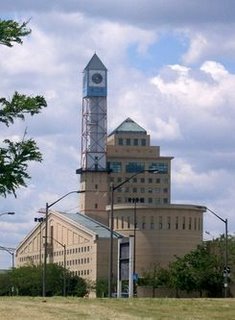
This may be the future of Mississauga - The future for the downtown core looks bright.
Mississauga Business Times Where is our city's skyline? We might see a Mississauga core with real identity says U of T professor
"You're never going to see an office tower in the city centre, unless Mississauga decides they will build parking in conjunction with the developers."
Where is the Mississauga skyline?
Having surpassed the 700,000 mark in population, Canada's sixth-largest city still lacks the downtown commercial skyscrapers traditionally equated with the world's great cities. While there are plenty of condos going up, the city centre hasn't seen a new high-rise office building in more than 20 years.
"There's a real easy reason for that," says Jim Wilson, vice-president of Cushman Wakefield & LePage's Mississauga office. "That's because we've got land, and it costs more to go up than it does to go out."
Ray Wong, senior analyst with CB Richard Ellis agrees that, "in Mississauga, the land costs are a lot more affordable (than in downtown Toronto). As well the floor plates are a lot larger."
"There's not really a need to go high up," he says. "The higher up you go, the more expensive the building."
When the question is put to him, J.J. Barnicke Ltd. Chair Joe Barnicke responds, "The city can do nothing about it. If there's a market for office skyscrapers, it will be there. When you get the really large firms, if they're going to Mississauga, they're going to have their own building."
Indeed, major Mississauga-based corporations like Microsoft Canada, and Bell Mobility, have chosen to build stand-alone monuments along the 400 series of highways. Banks like RBC and TD have, similarly, moved some of their back room, processing functions out to this suburb, while their executives have remained in the Bay Street towers for that all-important presence, and to be, "where the action is."
Wong explains that in the car-intensive suburban market, it makes sense for office development to gravitate to areas like the Hwy. 10-401 nexus, where it's more accessible for employees to get to work (in the absence of a heavy-duty public transit network), above-ground parking can be provided for employees (versus them having to pay for it in the city centre), and companies can exercise better control over their facility.
"There's nothing wrong with a suburban market, and not having a full downtown. It's just based on demand," he adds. "And in Mississauga, there's a lot more options to build, with respect to land."
Jim Murray, senior vice-president with J.J. Barnicke's Mississauga office says it really comes down to one issue: parking.
"You're never going to see an office tower in the city centre unless Mississauga decides they will build parking in conjunction with the developers. The cost of parking is prohibitive," he states.
According to Murray, an underground parking space in the downtown core costs approximately $35,000, and the net return from that is about $1,800 a year in rent.
"I would say 15 years ago the most attractive node for office occupancy was the Mississauga city centre. Today, it's not even close," he continues. "The Airport Corporate Centre is more dominant, Meadowvale is more dominant."
"When the greenfield sites are gone, then there will be the rationale to invest in parking facilities and attract the critical mass to the city centre."
While it may be the general impression that Mississauga is all but built out, Wilson observes that "relatively speaking, we do have land left here for office development. We've got land on Hwy. 10 between 401 and 407 which will be the next focus of development."
Paul's Properties, for example, has just purchased land at Courtneypark and Hurontario.
He says this area is now a destination for flex office development, which from both a landlord and tenant's standpoint is "timely and relatively inexpensive."
"We haven't seen development (in the Mississauga downtown) because frankly rents have not been able to justify the costs," he adds. "In the city centre you have to provide underground or on the street parking, and because of that it costs more to build, and it takes a lot longer."
What's more, he says landlords are looking at new ways of calculating square footage (to maximize their returns), so that long-term tenants looking to renew their leases in the city centre may be in for some "sticker shock".
"Companies like having the flexibility to do a design-build, because if you're operating your own building you're not paying somebody a management fee, and it's a more efficient building," he adds.
Wilson suggests that "from an urban perspective, a lot of people mistake density for importance and significance. And a lot of people in downtown Toronto are fighting to reduce densities, and improve the balance between working and living space."
He deems the recent LEED (Leading Energy and Environmental Design) standard for environmentally-friendly construction and occupancy of buildings to be "the single most important development in North America in decades."
Within three years he feels, "probably every federal, municipal and provincial office will be mandated to be occupying a LEED-certified building."
However, with three exciting new, high end hotel/condo projects pegged for the Toronto downtown (including the Trump Tower, and the Shanghai), comes the harsh reality that Mississauga's city centre has still not attracted a second hotel to accompany the Novotel.
"That will have to come as a participation between the private sector and the public sector (in terms of parking). And I think it's coming," Murray comments. "Otherwise, you will continue to see condos."
"I could see office buildings downtown, but I question hotels," Barnicke adds. "Because if you're going to build hotels in Mississauga, it's going to be closer to the airport."
Citing the recent condo design competition within Mississauga, which produced the exciting, twisting, "Marilyn Monroe-style" Absolute building as its winner - reaching the front pages of the Toronto dailies - Dr. Alan Walks, a geography professor at University of Toronto, specializing in urban studies, says, "it looks like it is heading in that direction. I think (the city centre) will eventually have a dense, identifiable cluster of skyscrapers and office towers."
"We're likely to see a Mississauga city centre with an identity of its own."
Dr. Walks observes that while for many years, the City of Mississauga followed an approach to urban planning which "reinforced the sprawl aspect", the city reached a turning point in the mid-'90s and has since been pushing to make the downtown a mixed use, high-occupancy location.
"They've yet to be able to attract those type of uses, other than residential and retail. In the future, it's possible. There's a tendency to follow where the people are."
"So far it has been driven by condo development, but saying that, businesses will look at points of accessibility, particularly if they can make it easier by bringing in rapid transit," he continues. "So as more and more condos get built at close proximity, it will be cheaper and cheaper for office buildings to be built in that area."
Wong agrees that with the heavy concentration of condos sprouting up, office towers may follow because "people want to be close to work."
"Look at the condo development (in downtown Toronto)," he adds. "It makes the city more livable."
While acknowledging the lingering image of the Mississauga city centre as sterile and reflecting current trends from 25 years ago (with a shopping centre at its heart), Wilson feels the developers at city centre "have done a great job of infilling occupancy levels with residential units, and that the infill of development on the west side of Hwy. 403 has added to the attraction (with restaurants, movie theatres, and retail). "I see absolutely nothing wrong with residential development in the city centre," he says. "If you're going to have high-density residential development, I think the city centre is the place to have it."
"Density is happening. It is innovative, and I think Mississauga is a model a lot of cities should be following - because they do things right. I think too many people denigrate the city for a lack of character. That's kind of the Canadian way."
Dr. Walks, likewise, doesn't have any problem per se with the heavy retail uses in the city core.
"It's the way these areas have evolved, particularly with the large (Square One) parking lot between retail and city hall. If the retail abutted right at the city hall area, you'd have a lot more intimacy, and you'd achieve synergies."
"But I don't see the city centre having too many barriers, to making it a livable, synergetic location. There's a few problems." Article courtesy Mississauga News and Mississauga Business Times
For more information please contact A. Mark Argentino
A. Mark Argentino Associate Broker, P.Eng.,
Specializing in Residential & Investment Real Estate
RE/MAX Realty Specialists Inc.
2691 Credit Valley Road, Suite 101, Mississauga, Ontario L5M 7A1
BUS 905-828-3434
FAX 905-828-2829
E-MAIL mark@mississauga4sale.com
Website: Mississauga4Sale.com










No comments:
Post a Comment